Netherlands
Factsheet
| ETHNIC MINORITIES: | |
|
Indonesian: Turkish: Surinamese: Moroccan: Roma: |
2.4% 2.2% 2.0% 2.0% 0.24% |
| RELIGIONS: | |
|
Roman Catholic: Dutch Reformed: Calvinist: Muslim: |
30% 11% 6% 5.5% |
| NET MIGRATION: | 50,006 |
| POP. GROWTH RATE: | +0.4% |
| GDP GROWTH: | +0.7% |
| GDP PER CAPITA: | 45,955 |
| UNEMPLOYMENT: | 6.7% |
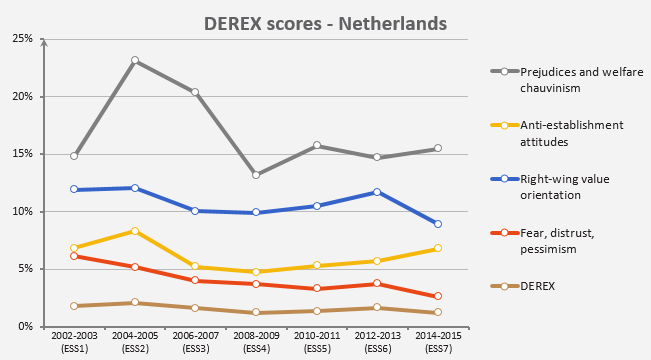
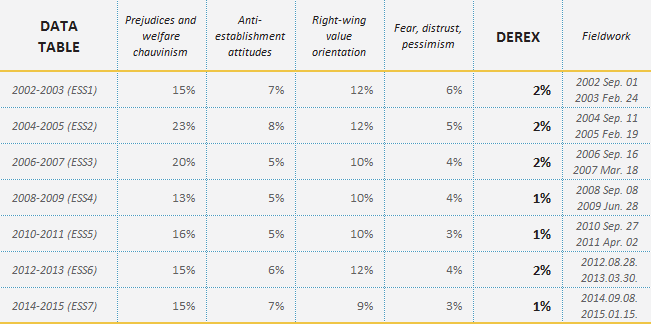
Party for Freedom (Partij voor de Vrijheid, PVV)

Charismatic leader Geert Wilders, formerly a member of the Centre-right People’s Party for Freedom and Democracy (Volkspartij voor Vrijheid en Democratie), founded the Dutch Party for Freedom (Partij voor de Vrijheid, PVV) in 2004. Central to the program of PVV is immigration policy. Wilders has claimed there is a direct connection between immigration and problems related to welfare, infrastructure, housing and transport. The party focuses its attacks on Muslim immigrants. It wants an end to immigration from Islamic countries, the party wants all Muslim criminals deported and others paid to leave. Further policies include the banning of mosques and Islamic schools and the introduction of a tax on headscarves. The party opposes the EU, claiming that the European constitution undermines national sovereignty, and is against development aid. On economic policy it holds a populist position, arguing for more spending but lower taxes. Wilders has gained notoriety for his incendiary comments on Islam. He has called for a ban of the Koran, describing it as the ‘Islamic Mein Kampf’, and has claimed that nearly all terrorists are Muslims. Wilders portrays himself as a moderate and distances himself from the Front National, the Austrian Freedom Party and far-right groups in Italy.
Following the 2006 general election, the party gained significant strength and peaked with a support of 15.5% in the 2010 election, dropping back to 10.1% in 2012. PVV's relevance increased when it offered the government outside support on crucial legislative issues between 2010 and 2012. At the same time, the PVV suffered a setback when in 2012 a number of its MPs left the party complaining about the lack of a democratic organizational structure and criticizing Wilders’ autocratic leadership style.
In February 2014 support for the party reached 17.6%, putting it on top in party rankings. The solid domestic voter base was also reflected in the 2014 European parliamentary elections, where the PVV achieved third place with 13.3% and a year later in the May 2015 Senate elections, where the PVV received 13.1% of the votes and won 9 seats.
The party prepared for the EP campaign under the auspices of the European Alliance for Freedom, created jointly by Vlaams Belang and Front National. A manifesto issued at its first press conference on December 11, 2013, the EAF identified the creation of regional, monetary, legislative and national sovereignty as the cornerstone of a future Europe. This group however failed to succeed in the EP. In May 2015, PVV, along with Front National, FPÖ, Vlaams Belang, Northern League, UKIP and KNP formed a far-right group within the European Parliament called the “Europe of Nations and Freedoms” (ENF). The PVV is especially critical of the EU’s migration policy, and the bailout packages provided by the Union and the ECB during the economic crisis primarily to South European countries and banks. The PVV rejects economic and financial solidarity because, in its opinion, it undermines the competitiveness of the Dutch economy.
PVV on the Internet:
Sources:
- Jamie Bartlett et al.: “The New Face of Digital Populism.” Demos: London 2011, p. 102-103. Available online at http://www.demos.co.uk/files/Demos_OSIPOP_Book-web_03.pdf?1320601634
- Political Capital
European elections - May 22, 2014
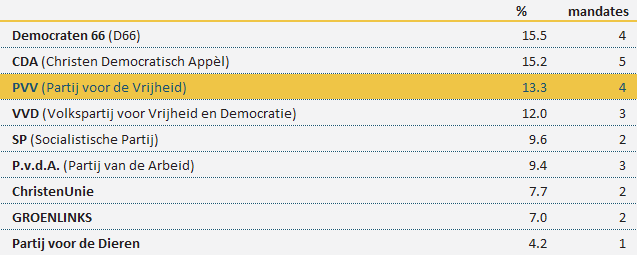

Parliamentary elections - September 12, 2012
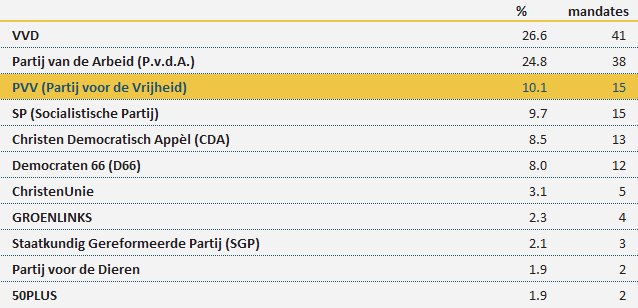
Parliamentary elections - June 9, 2012
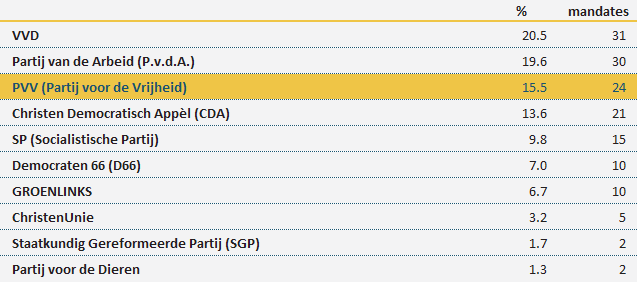
European Parliament elections - June 7, 2009
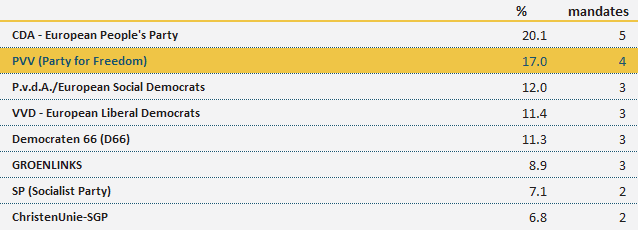
Source: Electoral Council; EP2014
Our thematic websites
Political Capital's analyses and activities in English.
Research and advocacy programme focused on the role conspiracy theorising plays in shaping populist and radical politics.
Our project New electoral system in Hungary: watchdogging, advocacy and raising awareness focuses on the electoral reform in Hungary.
Our blog on political and societal extremism and conspiracy theories.
DEREX website is supported by










